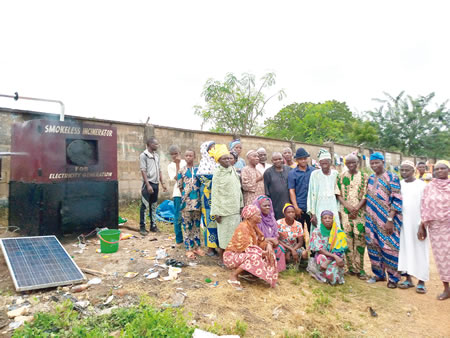IT is possible to live decades in Ibadan and never hear of Kube-Atenda, not to talk of visit the place. It is a rustic community located in Agodi area of Ibadan, tucked somewhere between Queen Elizabeth Road and Gate-Molete road.
It appears to be a closely-knit community judging from the manner in which the residents, young and old, male and female, Christian and Muslim, gathered in simple, everyday garbs to witness the demonstration of what could be termed the first community-based waste to energy facility in Ibadan, the capital city of Oyo State.
Though it is underdeveloped lacking tarred roads and a proper layout, Kube-Atenda is fortunate because it has been the site of a number of research projects by researchers.
The waste-to-energy facility is the brainchild of a team of environmentalists led by Dr Taiwo Hammed from the University of Ibadan’s Environmental Health Sciences Department.
According to him, the project “set out to provide long lasting solution to solid waste management problems in the area so that people will not revert to their old waste management processes that were not environmentally friendly such as stream dumping and open burning and also prevent plastic waste getting into water bodies, leading to marine plastic pollution.”
Indeed, solid waste management is a big challenge across Nigeria. The nation’s commercial capital of Lagos and Ibadan, the Southwest hub, have had their fair share of challenges in solid waste management, with the governments of both states sacking their respective waste contractors, Visionscape and WestAfricaENRG, in recent time.
Elder Abraham Odeyale, the chairman of Kube-Atenda community, told Ecoscope that disposal of waste has long been a challenge in the community.
According to him, once upon a time, waste was being burnt or disposed in the community stream, but they had been taught to desist from such disposal methods. Therefore, the community members had been paying a token fee for a waste contractor to clear their waste. He, however, said the waste collector had been unavailable of late.
Elder Odeyale also said that the power situation has been problematic too. “Most of the time, darkness has been what we reckon with in this community. But with this project, light has come, and we believe it will be extended.”
However, the facility will reduce the amount of waste that needs to be disposed from the community.
Team members, Sola Oladeji and Ajao Ahmed, said they fabricated and completed the waste-to-energy project in two weeks.
They told Ecoscope that the facility basically generates gas that powers a generator for electricity supply and produces oil from which diesel and kerosene can be distilled.
The electricity supplied will be used to power a phone-charging centre, that will financially empower the youths who will man the centre. The electricity generated will also power streetlights and thereby improve security in the area.
They added that the incinerating unit is fed with non-biodegradable waste like PET bottles and polythene bags.
The project comprises a pyrolytic chamber that will generate syngas from all types of combustible solid wastes, a container for the gas and a generating set.
The project holds great promise in that it is scalable. To produce more gas and subsequently more electricity, a bigger generating set is needed, coupled with an increase in the waste fed into the pyrolytic chamber. The current setup powers a 2.4kva generator.
Giving more details about the project, Dr Hammed said: “This is my contribution to humanity. As a scientist, I asked myself, what is my impact on society?
“A lot of waste is being generated in Oyo State. If you look anywhere, you find waste. So, are we just going to fold our arms and look at it? That is how I started to think how we can curb the menace of waste generated in our communities, right from the point of generation, from the source. If we can achieve this, very little amount of waste will get to the streets. That is how I started thinking of how to manage waste directly from the communities.
Speaking about the project, he said, “This is an action oriented and community-based waste management project. This is a pilot project and the first of its kind in Nigeria as far as I know. My intention is that if waste can be recycled, energy can be recovered to light the streets. This is a major aim I have in setting up this project.”
He added that a project like this that not only solve environmental challenges, but helps solve the poverty problem by generating income for youths at the phone-charging centre, naturally becomes sustainable.
Dr Hammed of the Department of Environmental Health Sciences, Faculty of Public Health, College of Medicine won a second round of the Climate Impact Research Capacity and Leadership Enhancement programme (CIRCLE) Research Uptake Fund. The fund provides grants to alumni of the CIRCLE Visiting Fellowship programme to conduct activities aimed at ensuring the uptake of their CIRCLE research findings by end users. The Kube-Atenda waste-to-electricity plant is Dr Hammed’s CIRCLE project executed with funding from the Association of Commonwealth Universities and Department for International Development (DFID), UK.
WATCH TOP VIDEOS FROM NIGERIAN TRIBUNE TV
- Let’s Talk About SELF-AWARENESS
- Is Your Confidence Mistaken for Pride? Let’s talk about it
- Is Etiquette About Perfection…Or Just Not Being Rude?
- Top Psychologist Reveal 3 Signs You’re Struggling With Imposter Syndrome
- Do You Pick Up Work-Related Calls at Midnight or Never? Let’s Talk About Boundaries






